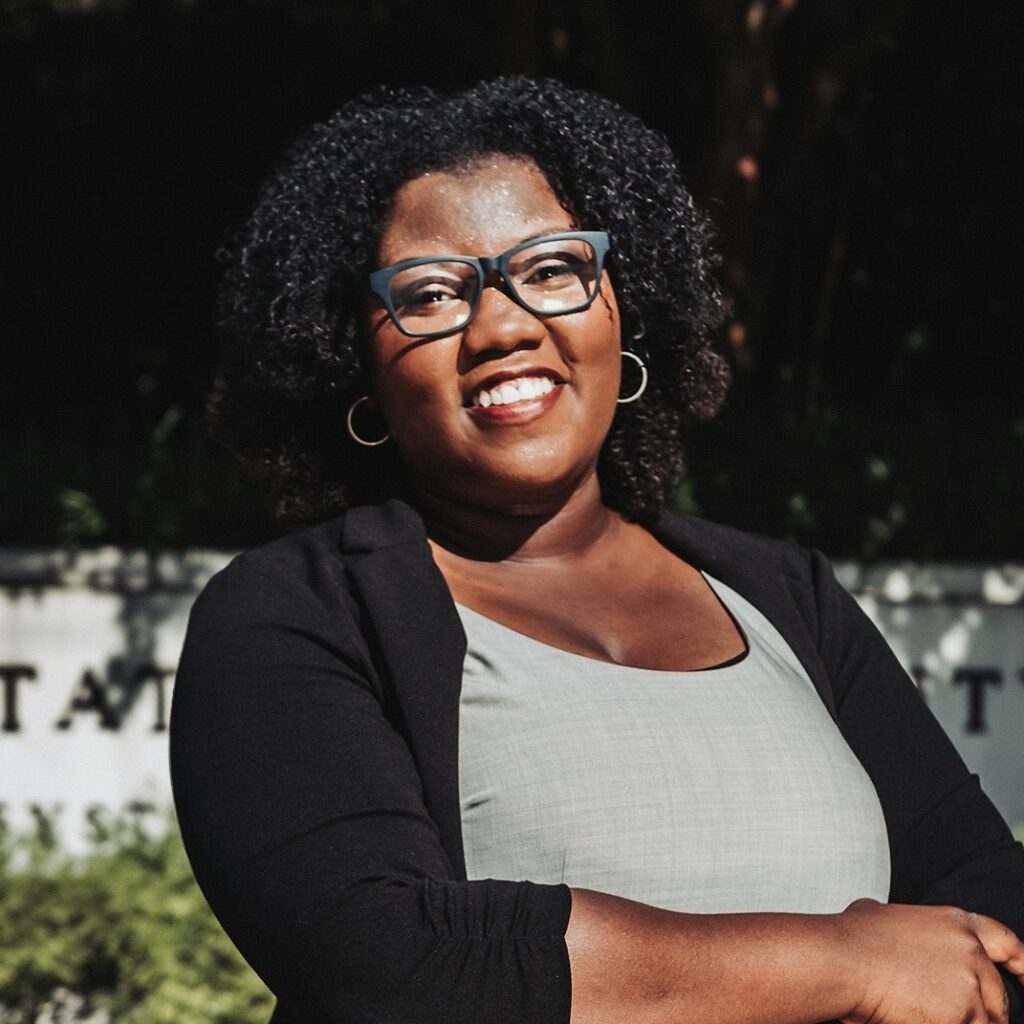
Clayton Democrats sent out a questionnaire to all 10 candidates for the September 21, 2021 special election for Clayton County Board of Commissioners District 1. We received five responses. The following are responses from candidate Alaina Reaves. We encourage residents in District 1 to vote on Tuesday for who they would like to have in this position.
1. What qualifications do you have that make you qualified than the other candidates?
I am the best candidate for this job, because Clayton County is on the verge of expansion and I am representative of the largest growing demographics in the county and Metro Atlanta. I am a millennial, first time homeowner working remotely. We are one of the youngest counties in the Metro area, but lack cultural venues and recreational activities for all ages, these young residents are the future economic base and current workforce in the county. We have the most affordable housing options in Metropolitan Atlanta, and renters/ buyers are moving to the county as housing costs rise elsewhere. Clayton County is a burgeoning logistics hub with hundreds of acres of undeveloped and under-developed land ready for use. The County Commission will decide and shape Clayton County through planning and zoning, economic development, and setting the priorities that will shape the next 10 years.
I plan to make infrastructure a priority in the budget. This is not limited to road repairs, but also improvements such as increasing sidewalks, adding traffic calming measures and making intersections safer for pedestrians. Over 50% of residents in Clayton County are renters, yet many of the programs and assistance offered by the county directly assist homeowners and homebuyers. On the County Commission I plan to recruit affordable rental properties to the District and demand renter’s rights for living standards and rental relief, especially during this COVID-19 pandemic.
2. What incentives would you offer businesses to come to Clayton County?
In Economic Development, we commonly use incentives as a part of the toolbox of resources for incoming and existing businesses. Before heavily recruiting new businesses to Clayton County and in District 1, I would survey the needs of existing small businesses, companies, and franchises. I would look into securing funds through options such as the Community Development Block Grants, the Community Development Financial Institutions Fund (CDFI Fund) through financial institutions and nonprofits, and establish Public Private Partnerships. I firmly believe that Community Improvement Districts are under utilized in Clayton County, through this process businesses in a designated perimeter essentially paid a deferred tax to improve the areas within those boundaries.
When recruiting companies and new business, it is important that we address the needs of existing businesses. When we create an environment for businesses to thrive in Clayton County, it becomes that much easier to recruit new businesses using incentive tools like the federal Opportunity Zones tax benefits and Tax Allocation Districts. A very important tool that Clayton County has is its Tier 1 standing with the state Economic Development Office and Department of Community Affairs. A Tier 1 rating recognizes an area that is in distress and the state provides a tax incentive of $4,000 per job a company creates in a Tier 1 district. While this Tier 1 standing acknowledges some challenges in Clayton County, it is an opportunity to invite companies to locate in Clayton County bringing jobs and opportunities.
3. What percentage of Clayton County’s budget comes in the form of direct payments and all grants from federal sources of indirectly through state money and non-cognizable grants sourced from the federal budget?
Clayton County typically receives less than 2% of its revenue from intragovernmental grants and federal or state sources. In May of this year, Clayton County received $66 Million in emergency COVID relief funding through the American Rescue Plan Act (ARPA). Those funds were distributed to Clayton residents through the Clayton Cares small business grants, emergency rental assistance, and funding to promote the health and safety of Clayton residents during the COVID-19 pandemic.
4. Dekalb County has implemented ways to increased Covid-19 vaccinations. What are some of your ideas to increase COVID vaccinations in our county?
The health and well-being of Clayton residents is the biggest priority. I applaud Dekalb County for their success getting their citizens vaccinated against COVID-19. As a community organizer, I fully believe in meeting people where they are and using innovative ideas to reach them. One option to increase vaccine rates is providing incentives like lotteries or gifts to residents who get the vaccine. Partnering with churches, community groups and organizations is another way to connect with the community and increase vaccination rates. Most important is hearing community concerns around the vaccine, addressing its effectiveness and benefits using fact-based information.
5. What has been your community involvement prior to seeking the seat of the District I Commissioner?
I am a veteran community organizer who is passionate about building connections and engaging with my community. I spent more than 10 years as a public servant working in the nonprofit sector and every level of government. I grew up in Clayton County volunteering in the community with my church and as a Girl Scout. Throughout Georgia and Clayton County, I spent years advocating for voting rights and civic engagement. In May of 2020, as president of the Clayton County Young Democrats, we hosted a widely-attended candidate forum for the legislative and municipal primary elections. Last year, I was elected as the youngest Democratic National Committee member for Georgia. Locally, I have served on the City of Morrow Urban Redevelopment Agency for the past two years and was recently appointed to the Clayton County Citizens MARTA Advisory Board. I pledge to use my skills and experience to enact smart policy, invest in the community, and improve the quality of life for the people of District 1.
6. As a commissioner, you will be able to appoint persons to the various county boards, How will you ensure that you’re selecting the right individual?
A very important opportunity for Commissioners to receive input from the community is through board appointment for district citizens. There are over 20 boards and advisory groups in Clayton County ranging from the Parks & Recreation Advisory Board, Board of Health, Elections & Registrations, and 2 boards dedicated to zoning. I would seek community input for recommendations using resumes and community experience. I would interview potential candidates and potentially host public discussions with applicants.
7. There is 14months left in the unexpired term of the late Commissioner Sonya Gregory. If you are elected, what will be your priority?
My top two priorities for the remaining months in the unexpired term is beautification and initiating a review of Zoning Maps. One of the most important duties of a Commissioner is to recruit businesses to the county including companies, restaurants and financial institutions. Before recruiting new businesses to the area, we need to revitalize the community by cleaning up the area. I want to evaluate the County schedule for mowing services, tree trimming, and overall maintenance especially on county-owned properties. I would utilize the Code Enforcement office to engage existing businesses on their appearance including addressing trash in parking lots and lawn maintenance. My second priority is to initiate a review of the Zoning Maps for the County. This review should be conducted with input from the Office of Community Affairs, Economic Development Office, Planning and Zoning boards, and most importantly the community and businesses.
8. How will you engage with the citizens in District I?
This is a great question! Engaging with Clayton County residents is something I have done for years, and am excited for the opportunity to engage with them as the next County Commissioner for District 1. I would recruit precinct leaders to report on the pulse of the community with regular meetings. I would connect with neighborhood leaders and HOA Boards in their neighborhoods to get an on-the-ground under view of the community including walking the neighborhood and streets. I believe in meeting people where they are in every area of their lives because complaints and concerns from residents are going to come from what affects them on a day to day experience. I would also convene regular town halls either in person or via Zoom during times convenient to the work and families lives of residents. Additionally, I would utilize social media including Facebook groups, email listservs, and Nextdoor app to engage residents virtually and foster productive discussion.
9. Are you aware of any other revenue streams that can be utilized other than raising property taxes?
Great question! We cannot balance the County’s budget on the backs of homeowners and property taxes alone. Most county budgets are sustained with revenue including property taxes, but a major revenue stream that Clayton County needs to capitalize is sales taxes from goods and services. In my conversations with District 1 residents, I heard from a near-majority of folks travel outside of Clayton County to shop for groceries and household items. This is a major loss in sales tax from county inhabitants. By recruiting high quality stores, restaurants, and grocery stores, Clayton County residents can keep that sales revenue within the County.
10. What is your position with regard to zoning changes within District I (with regard to logistic centers, retail development, housing, or other commercial develop)?
One of my first priorities is to initiate a review of the zoning maps to incentivize different forms of development besides the current trend of logistics centers, mechanic shops, and industrial buildings. To create a true live, work, play community, we need to have a variety of businesses and residential neighborhoods created prioritizing the needs of the residents who call District 1 home.
